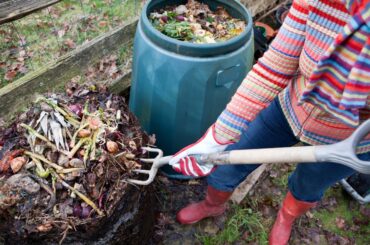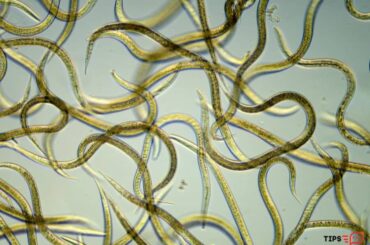I have been using cow manure as fertilizer for many years, as have many other farmers. Cow manure is renowned for fertilizing the soil. In addition to that, it can also improve crop quality.
So, if you proceed with cow manure, it would help you reduce the environmental impact of the organic matter too. However, it would be best if you could convert cow manure into compost and then use it for gardening purposes.
In this article, I have looked more into this aspect and elaborated on this subject in detail. You will learn about the benefits of using cow manure and the methods for making compost out of that as well.

What is cow manure?
Cow manure is known as cow dung. It would be more or less the digested grass or other digested food such as grains, fruits, and vegetables eaten by cows. One might think that it is just cow droppings. However, it contains elements such as hay, straw, grains, fruits, and vegetables. Furthermore, it may consist of other organic materials as well.
Cow manure is very fertile, and it can have a great impact on the plant’s vigorous growth. It contains 3 % nitrogen, 2 % phosphorus, and 1 % potassium. So the NPK ratio of the cow manure would be 3:2:1. This NPK ratio makes them a perfect choice for almost all plants and crops. This NPK ratio would balance the nutrients of the plants in an organic manner.
Having said that, cow manure also consists of ammonia. They may also contain pathogens and bacteria. For example, fresh cow manure may have E. coli bacteria. As such, it would be best if you could let the cow manure age or decay first and then use it. Once you use decomposed cow manure, it may not contain any of those harmful bacteria.
What are the advantages and disadvantages of using cow manure?
Keep in mind that there are both advantages and downsides to using cow manure as fertilizer on your crops. As such, you need to properly analyze what impact it may have on your plants. So, to help you with this, you could refer to the following advantages and disadvantages of using cow manure on your crops.:
Advantages of using cow manure on your crops
According to my research, one tonne of cow manure contains approximately 12 pounds of nitrogen. What is more interesting about this is that, out of this, 25 % of the nitrogen would be available for the plants by that time itself.
In addition to that one ton of cow manure contains about 2.6 pounds of phosphorus as well. As you may already know, phosphorus is yet another crucial nutrient for plants’ healthy growth. Not only that, but cow manure also contains other nutrients such as potassium, zinc, calcium, magnesium sulfur, and some micronutrients.
Cow manure would help the crops absorb nitrogen immediately, as aforesaid. Having said that, cow manure could act as a slow-release fertilizer as well. Some nutrients would be available only after they started to decompose. To briefly explain decomposition, it would usually take place once the soil microbes get in contact with nitrogen and break down the rest of the other organic materials while ending up releasing carbon.
Cow manure, unsurprisingly, contains a high concentration of water and organic materials. As such, you could use this as a liquid fertilizer as well. One more benefit of using cow manure as fertilizer is that it can improve the water filtration of the soil.
It can also help to reduce irrigation runoff. When the irrigation runoff reduces, it will consequently help the plants reduce their phosphorus loss as well. Overall, it would promote natural, vigorous, and healthy plant growth. It would also help the plants grow healthier.
Disadvantages of using cow manure on your crops
The variability of the nutrients in cow manure is a prime disadvantage of using them on your crops. Once the decomposition takes place, all these nutrients will break down and become available for the crops. Furthermore, if you end up using raw cow manure, chances are that it may include pathogens like E. coli and Salmonella, which would be harmful to food crops.
Besides, adding cow manure would take some time. It would be best if you could compost it and then use it on your crops. This is a process that would take several months. So, if you are an impatient gardener, it would be somewhat challenging for you.
If you had used chemical fertilizers and switched to organic fertilizers, it would be tough for you. Chemical fertilizers would be heavenly for your plants. It would give the necessary energy and growth for the plants.

Cow manure composting
You cannot use cow dung just like that on your crops. So, as explained in the article, you need to first learn how to make compost from cow dung. The best would be to avoid using raw cow dung since it contains ammonia, which would be harmful to the plant.
As such, I suggest composting the cow dung so that it will break down the bacteria and other organic matter into fertilizers. So, you can conduct composting in three main ways. To name them, you could use aerobic composting, hot composting, and vermicomposting.
Anaerobic digestion
Anaerobic digestion is a straightforward process that can be carried out in a sealed, oxygen-free environment. You simply have to place this inside a digester so that bacteria would break down the organic materials and convert them into useful elements. If you practice the anaerobic digestion method for composting, it would help you get biogas as well.
You could use biogas for cooking purposes as well as for heating. You will be able to get a significant amount of biogas from this. Besides, you could use the compost you get from anaerobic digestion as a liquid fertilizer as well. They would improve the soil quality and boost the crop quality as well.
In addition to generating fertilizer for your garden, it would help you make biogas and other sustainable energy for your household too. Not only that, but it would further help you to effectively do waste management as well. This means you can save money and positively impact the environment too.
Hot cow manure composting
This is a biological process. Usually, the microorganisms would decay the organic waste and transform it into rich organic matter. This is very simple, as you have to pile up the manure and let it happen naturally. What is special about this method is that you don’t need to provide a sealed environment for the composition to take place. Having said that, you would want to churn this periodically, as only then would all the materials in the pile decompose evenly.
If you want to make the fertilizers of higher quality, I suggest mixing the cow dung with other organic materials. For example, you could consider mixing them with hay, grass clippings, and some appropriate food waste. Furthermore, you may mix this with sawdust too. It is noteworthy that this process would take place over a longer period. Furthermore, you have less control over the results of the composting process.
This process would usually take place at a high temperature. At high temperatures, the microorganisms would break down the organic matter. So, it would kill whatever harmful pathogens and other weeds the cow dung contained.
Having said that, it would be best if you had a large pile of cow dung, as only then can the microorganisms grow. It will enable the compost pile to maintain the required temperature of 55 °C (130 °F) for several days.bilobed
Vermicomposting
Vermicomposting could be done using various types of earthworms. For example, you could use a red worm called Eisenia foetida for this process. What usually happens here is that the earthworms tend to consume the raw cow manure and transform it into vermicompost. This is considered one of the most excellent composting methods for boosting crops.
You will be creating a compost pile here and allowing the worms to digest manure. In terms of the timeframes for this process, it would usually take a few weeks to several months. The duration would vary depending on the amount of waste you have as well as on the number of earthworms. However, if you are proceeding with this option, ensure that you keep an eye on the biobed, as chances are that the bacteria will tend to reproduce once this takes place.

What does composted cow manure contain?
The materials that cow manure may contain would vary depending on the process you used to create it and on the other organic material you used as well. Cow manure includes macroelements such as N, P, and K; nitrogen is a crucial factor as it would determine the protein levels of the plants.
In addition to that, phosphorus would be useful for flower production. Lastly, potassium is helpful for the growth rate and water regulation of plants. Lastly, it contains elements such as calcium, magnesium, sulfur, iron, and carbon, as well as some other critically important nutrients.
Apart from that, cow dung contains high amounts of water too. Thus, it would be easy for fertilizers to balance the ph levels and the temperatures of the soil. Consequently, it would be beneficial for plant root growth and biological activity in the soil as well. Needless to say, using cow dung for fertilizer is an environmentally friendly way to dispose of cow dung waste.
Is it safe to use cow manure on your plants?
It is safe to use cow manure as fertilizer if you have composted it completely. Once you composted it effectively, it would ensure that it did not contain any ammonia and other harmful pathogens. That way, those elements would not pose any threat to you or your plants. If you end up using non-decomposed waste, it would end up contaminating the soil and freshwater sources.
Can You Put Too Much Cow Manure In Your Garden?
If you end up supplying too much cow manure, chances are that it will result in excessive vegetation in your garden. Excessive manure could result in environmental problems such as nutrient runoff and nitrate leaching, too.
What Is The Difference Between Cow Manure And Steer Manure?
Both cow manure and steer manure are the same. However, the only difference would be the salinity level. Steer manure contains high levels of salt when compared with cow manure. As such, it may badly impact your plants.
What Is Cow Manure Good For?
It would be great as a fertilizer and as a soil amendment, too. It would give the plants the necessary boost of nutrients and improve the condition of the soil as well.
Which Vegetables Do Not Like Cow Manure?
Plants such as tomatoes do not like cow manure. However, they are safe to use on root vegetables such as potatoes and carrots.
Is Cow Manure Safe For Vegetable Gardens?
If you are using thoroughly composted manure, it will be safe for your vegetable gardens. Having said that, you should avoid using raw cow manure as it will not be safe. If you apply fresh manure, chances are that it may transfer harmful bacteria to the plants.
Can You Mix Manure With Potting Soil?
You could mix manure with potting soil. However, you need to do this only if the cow manure is thoroughly composted. It would help you enrich and extend the potting mix. Besides, you could use cow manure as a top dressing for the potted and container plants too.

FAQ
How long does cow manure take to decompose?
Normally, the decomposition process takes three to six months. However, it would vary depending on several factors.
How much cow manure do I add to the soil?
You need to add 1 part dehydrated cow manure to 3 parts topsoil. However, if you have poor-quality soil, you need to add cow manure and soil in equal amounts.
Can I put cow manure on top of the soil?
I don’t recommend putting fresh cow manure on top of the soil, as it can contain bacteria that would contaminate the plants. Furthermore, it may cause diseases in humans too.
Can You Make Cow Manure Into Plant Food?
You can make cow manure into plant food called “foliar spray.” To make it, you need to fill a bucket to a height of about one-third with fresh cow manure. Thereafter, you can fill it with some fresh water. Leave it for about 24 hours. Next, you can apply it to the garden using a strainer.
Is Chicken Manure Better Than Cow Manure?
If we compare Cow manure with chicken manure, cow manure is better than chicken manure. Chicken manure is hotter. As a result, you should avoid applying them directly to the garden, as they may burn both the roots and the stems. On the other hand, cow manure is not that hot when compared with chicken manure.
Final words
Using cow manure for composting is a cost-effective way in terms of waste management. It would help you produce high-quality fertilizer for almost all plants. Having said that, it is vital that you properly compose them and then use them so that you can get the best results. In addition to that hope, you learned a lot about the techniques you could use for composting as well. So, use these tips for your gardening project and make gardening a much more fun activity.





